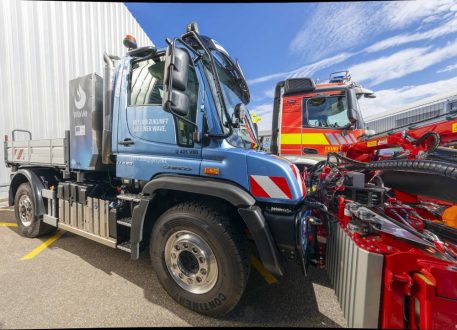Smart load carriers for transparent logistics
Thanks to the interconnectivity of objects within production and logistics, the Internet of Things (IoT) is encompassing increasingly widespread segments of industry. Equipped with modern sensor technologies and digital services like Cloud solutions, real-world objects are connecting with virtual applications. This means that load carriers and transport packaging used in logistics are also evolving into cyber-physical objects.
Installed on or in load carriers like boxes or pallets, sensors can determine data such as temperature, moisture, shocks, location and product quantities removed. In real time, the data is transferred to corresponding applications on computers, tablets or smartphones and evaluated. The use of RFID and NFC chips also ensures more effective protection against counterfeiting and theft. However, QR codes are now also in widespread use as a means of connecting load carriers to the virtual world.
Real-time tracking and tracing
Even now, sensors, chips and codes are allowing logistics planners to track routes in real time and ensure that load carriers and the goods they contain arrive at the right place at the right time. Thanks to the data transmitted, supply chain participants find out about any incidents or deviations from the schedule in good time and can respond promptly. Material planners also know how many load containers are in circulation at any given time, so they can quickly identify and rectify any backlogs or shortages of load containers affecting customers or service providers.
Smart solutions like these play a crucial role for automated transport and warehouse logistics in particular. For logistics planners and their customers, these extra digital options offer added value if they can be connected to the IT systems of the respective company. Another option is to give the customer access to certain parts of its own service platform, for example using a Cloud solution. These kinds of systems allow companies to collect and evaluate data on the current status of the supply chain, identify critical situations and prevent disruptions in the logistics process.
Simplified material management
One example of cyber-physical load carriers are plastic pallets and boxes with RFID or in-mould labelling to ensure the traceability of goods along their route. In the case of the latter, the codes are permanently fixed to the load carrier and therefore cannot get lost. But QR codes on traditional wooden pallets, boxes and crates also give load carriers interactive functionality. The information they contain can be read by various smart devices connected to a network.
In addition, modern systems offer interfaces for numerous other applications and therefore can also be linked to artificial intelligence (AI). At FACHPACK, for example, the Fraunhofer Institute for Material Flow and Logistics (IML) presented a smartphone app that allows pallets to be counted using image recognition. This is intended to considerably simplify the exchange of pallets and other transport packaging. This means that all participants in the supply chain then know, for example, how many containers are in the warehouse, whether sufficient containers are available or new containers need to be ordered, and which products are in which load carriers.
The Fraunhofer Institute for Integrated Circuits (IIS) is exploring another aspect through its research project DProdLog, which is looking into the automatic reordering and tracking of Kanban bins in manufacturing companies. The smart containers determine the fill level and are connected to a service platform. This allows logistics personnel to record inventory and automate the delivery of parts.
The use of intelligent load carriers makes logistics processes more transparent and efficient. They can also save costs as an effective tool against stock shrinkage or for determining where damages occurred. In the production environment, smart load carriers fitted with sensors ensure that there is always sufficient material replenishment. Packaging and load carriers have therefore long since expanded their functions as a means of protection and logistics support to become indispensable information carriers within the supply chain.
NürnbergMesse GmbH
Messezentrum
90471 Nürnberg
Telefon: +49 (911) 8606-0
Telefax: +49 (911) 8606-8228
http://www.nuernbergmesse.de
Telefon: +49 (911) 860683-55
E-Mail: press@fachpack.de
Telefon: +49 (911) 860683-55
E-Mail: press@fachpack.de
![]()





